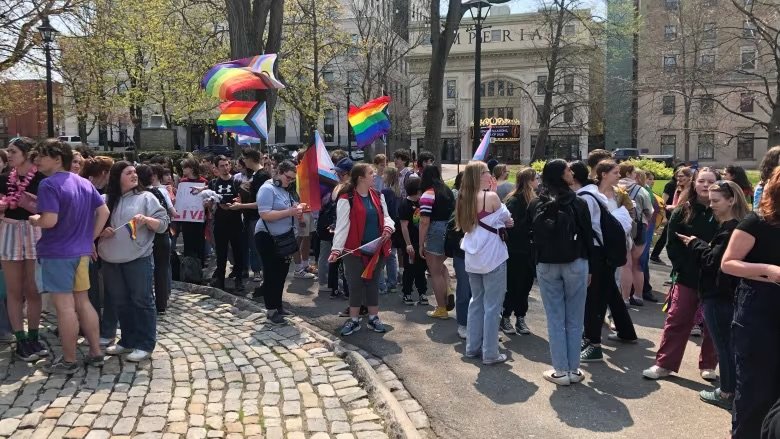New Brunswick Schools to Require Parental Consent for Student Name Changes
Photo Credit: Mia Urquhart/CBC
Hundreds of students in New Brunswick are protesting the recently changed Policy 713, a policy which significantly affects queer students in schools across the province. The new changes ban teachers and staff from referring to students under 16 by their chosen name and pronouns without parental consent.
The law, originally intended to allow a student to use a different name at school, was constituted on Aug. 17, 2020 by the New Brunswick Department of Education and Early Childhood Development. The policy was revised in May 2023 upon request of Bill Hogan, the province’s Minister of Education. This revision was approved by the New Brunswick Premier, Blaine Higgs, and Policy 713 was officially modified.
Many people in New Brunswick reacted negatively to the change, arguing that the policy is discriminatory against LGBTQ+ youth who are yet not comfortable coming out to their parents.
“These policies have a discriminatory impact on trans and gender-diverse students,” Harini Sivalingam, director of equality programs at the Canadian Civil Liberties Association, told CTV News. “For example, a cisgender student who wants to use a nickname doesn’t need to seek parental consent, but a trans student would be required to. So this clearly has a discriminatory effect that will cause harm to trans students.”
Along with concerned parents and children, federal cabinet ministers have also sounded the alarm about New Brunswick’s decision. According to CTV News, Marci Ien, minister for women, gender equality, and youth stated that the new policy puts transgender and nonbinary kids in a “life-or-death situation.”
Saskatchewan recently adopted a similar law to New Brunswick, which incited protests and rallies in support of LGBTQ+ students that have spread across the country. However, counter-protests sprung up as a result, which led to violent clashes between opposing groups. Significant gatherings came together in Halifax, Ottawa, Victoria and Vancouver, and multiple arrests were made.
According to CBC News, the Victoria police department advised people to avoid the legislature, stating that things had become “intense”, and two counter-protesters were arrested in Ottawa for “inciting hatred” by “displaying hateful material”.
Despite the public outrage opposing the new regulations, CTV News reported that Ontario education minister Stephen Lecce stated that parents should know if their child decides to change their preferred name at school.
Kelly Lamrock, a lawyer and political consultant, spoke out against this new change. Lamrock called the policy “overly discriminatory” and told CTV News that it “creates new human rights issues”, as “the restrictions on the use of a child’s preferred first name or pronoun targets LGBTQ students”.
The Progressive Conservative government in New Brunswick has recently clarified specific aspects of the new policy, after a critical report from the province’s child and youth advocate warned the changes could potentially violate children’s rights under the Canadian Charter of Rights and Freedoms. Now, certain social workers, psychologists, and in-school professionals will be allowed to use non-binary or transgender student’s preferred names without parental consent.

